by Nathaniel
Better late than never. And since we're of the calendar-denying opinion that each film year doesn't really end until Oscar night, we're not too late. (Rationalization is a useful skill, isn't it?). Still what is a calendar? What is a year? Distributors and filmmakers can't seem to stay on schedule either. Of this year's top nineteen, five are out-of-time, with four premiering at festivals way back in 2018 and one still waiting around to show its captivating face (though its here due to its qualifying release). However you define 2019 is up to you. These 19 pictures are how I define it.
If you see them, which I hope you will, they'll take you from ramshackle abodes in the mountains of Macedonia and cave-homes in Spain to an architectural wonder in Seoul and even past the rings of Jupiter. They'll trap you, tripping, in an empty school with house music throbbing or drop you in Dakar where the ocean is ever roaring with its promise and its ghosts. Socioeconomic anxiety permeated the cinema this past year, which is no surprise given the world we're living in. Though many of the top 19 spoke directly to the now, they weren't always "modern" in the literal sense. Our cinematic time travelling stretched from third century China through the Civil War era in New England to Hollywood in the summer of '69 and the stubbornly vague "near future" of science fiction...
NINE JUST OUTSIDE THE TOP TEN LIST (ALPHA ORDER)
- Ad Astra - James Gray's melancholy and beautifully executed sci-fi drama with one of two amazing Brad Pitt performances in 2019
- Atlantics - Mati Diop's sonically bold and visually electric debut in the haunted city of Dhakar with a distracted girl on the precipice of a loveless marriage
- Climax - Truth is stranger than fiction and Gaspar Noe's grungy hallucinatory dance/drug drama has to be seen to be believed.
- Honeyland - A beautifully lensed documentary, blessedly free of narrative hand-holding but no less expansive for it, despite its ultra-specific focus on a nomadic beekeeper's humble existence.
- Hustlers - What a year for female filmmakers. Lorene Scafaria arrives in a big way with a big entertaining drama about con artist strippers with one heavily lashed eye on the socioeconomic systems that created and trap them.
- Little Women - Greta Gerwig's personal take on a formative novel. Luminous, generous, and boldly deconstructed.
- Rocketman - Can all biopics of musicians be musical fantasies now? Inventive, boisterous, and as dumbly hooky as a pure pop song from a legacy artist.
- Transit - Christian Petzoldt's hypnotic World War II drama is freed from actual history to become an out-of-time resonant haunted dream of countryless refugees, and the living among the rubble of their own lost lives.
- Us - Jordan Peele's big hit starts with amusement park mirrors which is both on the nose and perfect for the doppleganger horror ahead. "It's us." If Us hadn't attempted to explain itself in that final half hour it might have been a new horror masterpiece rather than just a very very good time at the movies.
THE TOP TEN LIST
And the moment I fell hard for each picture...
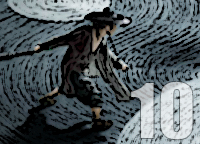 Shadow
Shadow
(Zhang Yimou)
Well Go. May 3rd
116 minutes
The moment: 28:30 Commander Yu is forced to strip by his king after defying his orders to declare war on their allies for control of the nearby walled city. The king, as a gesture of respect or humiliation (probably both) wants to tend to Yu's famous chest wound before he leaves the palace a commoner. What the king doesn't know is that the Yu isn't Yu at all but Jing (both roles played by Chao Deng, terrific x 2) and the chest wound is new, yet another ruse to maintain the illusion that... well, it's easy to get lost, like deep labyrinthine lost, in the palace politics with the plot points falling as quickly as the seven days of rain outside the palace. But here is where Shadow finally clicks in. Let the absurd melodrama of the elaborate plot twists flow and clog, stab or play, strip and redress, go yin or yang but just drink up those visuals. And what thrilling visuals -- not even talking about Chao Deng's body though that doesn't hurt. The striking shades of grey production design, inkwash black and white costumes, and cast of warriors and royals always in strictly composed formations (as in this scene) or executing battle choreography determined not by rank but gendered battle-weapons.. Adding to the already gobsmackingly silly beauty: all the palace intrigue takes place surrounded by decorative transparent scrims which also feature illustrated history; it's always repeating itself when it comes to these characters and that damned walled city. (Shadow was given a qualifying release in China and ended up a finalist for their Oscar submission in 2018, but wasn't released in the States until 2019)
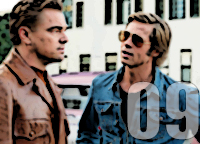 Once Upon a Time in Hollywood
Once Upon a Time in Hollywood
(Quentin Tarantino)
Columbia Pictures. July 26th
161 minutes
Nominated for 10 Oscars
The moment: 20:20* but the second time through (since the movie shapeshifts and grows with time apart from it). After a long and winding introduction and foreshadowing of all of the film's characters and events, we're off like a shot -- dangerously fast - in the car for a two minute drive with stunt man, no, driver Cliff Booth. It's here where the movie's meandering nature and constant crosscutting between film and TV history and these characters in their "now" begins to feel not like an indulgence but the point; this is a mosaic of collective feeling, shared fantasy, and nostalgia for the city that produces our dreams. The only certainty -- even history and "story" are disposable and malleable-- is that There Will Be Hollywood (gloriously recreated) all around us and it will be lovingly shot by Robert Richardson (outdoing himself). This plotless drive ends suddenly with a crane shot over a drive-in theater and Cliff arriving home to plentiful licks and love from his dog Brandy. Her love for Cliff is as pure as Tarantino's for the movies.
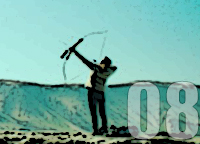 Woman at War
Woman at War
(Benedikt Erlingsson)
Magnolia Pictures. March 8th
101 minutes
The moment: 3:40 After our skilled heroine has blown some power lines in a criminal act of environmental activism, she attempts to escape the scene on foot, all to a memorably syncopated tuba and drum-filled score. When she stops jogging for a quick breather to dissassemble her weapons, we see three musicians out with her in the middle of hilly grassy nowhere playing that aforementioned score. They stop briefly, apparently confused by her exit, the story jogging right past them. The musicians will pop up intermittently throughout whenever the film score plays, never seen or acknowledged but right there at Halla's work, home, or elsewhere. It's a peculiar droll bit, but also a funhouse reflection of the righteous absurdity of Halla's quest, to stop massive global corporations from destroying the pristine beauty of Iceland with power plants and pollution. (Jodie Foster has optioned the remake rights but it's hard to imagine any filmmaker improving on Benedikt Erlinggson's highly original vision, which was submitted by Iceland for the 2018 Oscar race but not released in the states until 2019.)
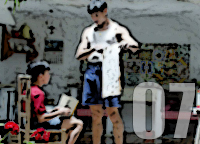 Pain and Glory
Pain and Glory
(Pedro Almodóvar)
Sony Pictures Classics. Oct 4th
113 minutes
Nominated for 2 Oscars
The moment: 00:01. Listen, it's a truth too rarely acknowledged or at least too rarely emphatically understood that we bring ourselves into any equation where we experience or evaluating art. Almodóvar is my all time favourite filmmaker so as each of his films begin, I already love them. How much? Well that's what depends on the film in question. But Pain and Glory begins perfectly with hypnotically colorful credits before sinking into the cool blue of a pool and a man apparently meditating while submerged (Pedro surrogate Salvador Mallo, played masterfully by Antonio Banderas). We get to the man through his scars in a perfect tilt up close-up from the pool tiles. And just as we've seen all of him, we're submerged as we presume he is in his childhood memories. It's a sublime opening, fluid like memory and full of mature feeling as it looks back on the past.
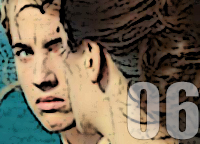 Portrait of a Lady on Fire
Portrait of a Lady on Fire
(Celine Sciamma)
Neon. Qualifying Release Only
121 minutes
The moment: 18:30 Sciamma expertly builds to the introduction of the titular woman, Heloise (Adele Haenel), who we first "see" as a headless painting, then as a hooded silhouette in longshot waiting to walk by the ocean. Portrait is not the sort of movie one usually hears described as fun but this cinematic tease is just that, albeit with a disquieting undertow, since suicide has already been mentioned and Heloise makes a dash towards the cliffs. The moment proves less dire, but still escapist in its exhilaration, as the lady turns to the camera in glorious reveal close-up. "I've dreamt about this moment for years". For Portrait's complex mix of passion, freedom, companionship and romance to work it has to be love at first sight for both the portraitist and the audience (the camera very noticeably takes on her POV in this entire sequence). We fall in love instantly together, the mysteries of passion firmly intact but a real challenge ahead. How to truly see someone else? Someone you can only furtively look at? Someone you'll lie to.
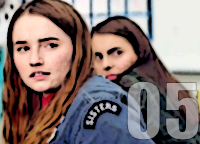 Booksmart
Booksmart
(Olivia Wilde)
United Artists. May 24th
102 minutes
The moment: 01:05. Two best friends dance outside of an apartment building. The moment is instantly endearing and this bit is funny. But the best comedy of the year will never stop at one laugh when it can just stack several on top of each other. The sound drops out and they're suddenly dancing without context, taking the moment from dorky cool to awkward funny, reminding us that Molly (Beanie Feldstein) and Amy (Kaitlyn Dever) are very much in their own world. Or maybe it was 18:45 when these besties chose matching outfits and get lost in hyperemphatic compliments. Who allowed this movie to take our breath away?... from laughter.
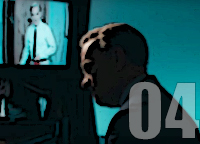 A Beautiful Day in the Neighborhood
A Beautiful Day in the Neighborhood
(Marielle Heller)
United Artists. Nov 22nd
109 minutes
Nominated for 1 Oscar
The moment: 26:00. Lloyd Vogel (Matthew Rhys) our "hero" -- though protagonist is a more apt word -- arrives on the set of a Mr Rogers Neighborhood to interview a real "hero". So here we have the filming of an episode inside a film which is itself an "episode" of that same show. Mr Rogers walks right out of the internal episode, into the overall episode (this movie) to greet Lloyd. He returns again to the scene and then he's back out to judge it, and pleased with his mistakes; children need to see adults deal positively with those, too. He never breaks character for he is the character... or chooses to be, same difference. Lloyd is flummoxed as anyone suspicious of the deeply earnest would be, and even moreso when he becomes the interviewee in his own interview. Heller's misunderstood movie is dizzyingly meta and gently profound once you, like Lloyd, drop your guard to let it in.
 The Farewell
The Farewell
(Lulu Wang)
A24. July 12th
100 minutes
The moment: 10:00 Billi learns the truth and the film's central conflict is expressed with both simplicity and depth. The direction, blocking, and cuts -- Billi suddenly sitting like a mirror image of her father, back to camera, her very different mother (who clearly judges her emotional nature) backgrounded until she's delivering the mandatory family line -- reveals that this gorgeously intimate and endearingly funny American immigrant drama will be as perceptive about family dynamics as it is about cross culture conflicts.
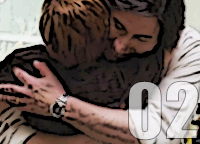 Marriage Story
Marriage Story
(Noah Baumbach)
Netflix. Nov 6th
137 minutes
Nominated for 6 Oscars
The moment: 3:30 "She's my favourite actress... / ... What I love about Charlie..." Marriage Story's altogether genius bifurcated opening scene, is, we learn when it ends, letters written as a couple's therapy exercize. The movie's terrific editing (by Jennifer Lame) marks and doesn't mark the pivot point between the two letters as the narrating baton is passed on the same rehearsal footage of Nicole (Scarlett Johansson) on stage with Charlie (Adam Driver) offstage collaborating on a scene together. Despite its plot (Divorce Story) the movie begins, as all divorces do, with the union. The masterful screenplay and both lead performancs have already fully engaged us in the stakes and loss of this once sacred partnership before the film even properly begins. But the loving reverie ends just a couple of minutes later, all that intimate lived-in feeling stubbornly unvoiced and folded right back up in the actual therapy office.
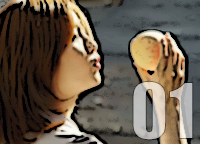 Parasite
Parasite
(Bong Joon Ho)
Neon. Oct 11th
132 minutes
Nominated for 6 Oscars
The moment: 6:45 After we've already witnessed the unemployed scavenger-like existence of the Kim family, a college friend arrives with a gift, that's meant to impart good fortune. The family son Kim Ki Woo (Choi Woo Sik) holds up his new gift, a decorative scholar's rock, in shallow-focus close-up. "This is so metaphorical," he says with awed glee. Well, yes.
If it hadn't been abundantly clear from the wifi hunt and pizza box folding of the opening scene, this instant masterpiece has a great sense of humor, not just within the story but about itself. This college friend might as well be Bong Joon Ho himself presenting Parasite, a perfectly sculpted movie, to us, with the same warning: "it's for you, but it's heavy". The pragmatic mom cuts the awed (self?) reverence off with a scoff, snapping the movie back to its sobering realities. "Food would be better."
P.S. And yes this means The Film Bitch Awards are in full swing with 25 of 40 categories now announced.
Page 1. Picture, Director, Screenplays (Complete).
Page 2. Acting (Complete).
Page 3. Visuals (Complete).
Page 4. Sound & Music (Complete).
Page 5. Bonus Acting Categories (In Progress).
Page 6. Characters of the Year (In Progress).
Page 7. Scenes of the Year (TBA).